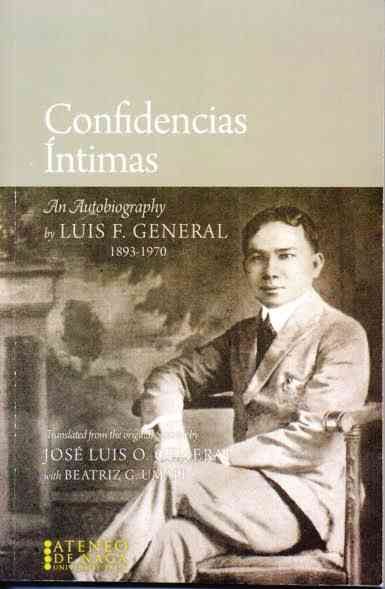Bits of Bicol’s past in lawyer’s memoir
What can make a book authored by a Bicolano lawyer an important read are the historical trivia and dash of idiosyncrasies defining his time a century ago.
“Confidencias Intimas” (Intimate Confidences) shares bits and pieces about the technology, education, politics, culture and the press through the lifetime of its author, lawyer Luis F. General from Naga City, from the late 1890s to the 1960s. It was published by Ateneo de Naga University Press.
Translated to English from its original Spanish manuscript by his great grandson, Jose Luis O. General, and the latter’s daughter, Beatriz G. Umali, the book contains unknown facts that fit into the historical narrative of Bicol, as well as in the different periods the author witnessed.
First phonograph
Awed by the new technology which an American teacher brought into the country in 1901, General remembered the first Edison phonograph being played in his class at a primary school in Ligao town (now city) in Albay province.
Article continues after this advertisement“The phonograph had the brand name, His Master’s Voice, and on the brand logo, there was an image of a dog listening intently in front of a phonograph,” General wrote, recalling the music machine brought by Louis McGregor, his American teacher whom the class called “Maestrong Luis” (Teacher Luis).
Article continues after this advertisement“How we children gaped in wonder at hearing the voice of a person singing very near, yet without seeing someone actually singing. For us it was truly marvelous,” he said.
General said the phonograph arrived in Ligao at a time when Gen. Simeon Ola, the last Bicolano revolutionary to surrender to the Americans, was “still marauding in the mountains of Guinobatan and Jovellar [towns].”
During his primary school years, General also noted the first automobile in Guinobatan and the only bicycle in Ligao. Commercial travel from Legazpi City to Manila during the early 20th century took two-and-a-half days and only by a steamship, named the Sorsogon.
End of Spanish era
General, a 1923 graduate of National University Law School in Washington, chronicled the end of an era when the Spanish language had to be supplanted by English in the courts, schools and official communications.
Introduced to the world of letters in Spanish through the catón (primary reader), and “Doctrina Cristiana,” a book on Christian doctrine, he lamented the demise of a language he loved and used to express and reason about the world around him.
“Spanish language was the lingua franca in the country at that time (referring to the early American period when he was a student); however what was happening now (in the 1960s, when he was writing the memoir) was the opposite. English not only outshone and laid Spanish aside; it had murdered it,” he said.
Orphaned in his teens, General completed his education through sheer determination and hard work. Throughout his education in Manila, he served and lived with the family of the doctor whom his family owed for the medical service provided his mother.
He worked as stenographer at the Senate and was a close-in staff member of President Manuel L. Quezon during the Commonwealth Period. This closeness to power gave him a front-row seat to witness the dynamics of national politics and the idiosyncrasies of Quezon.
General died in 1970 at the age of 77.
